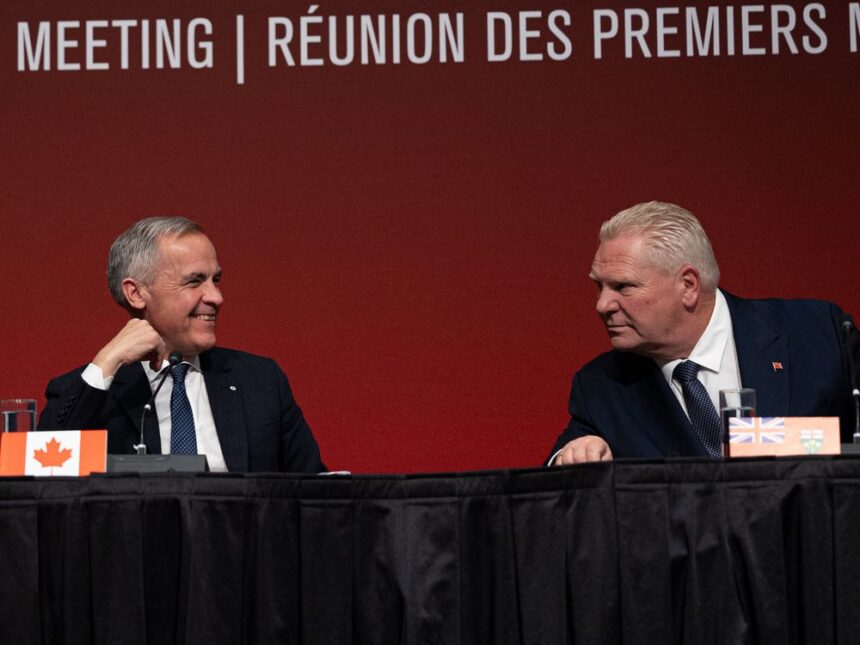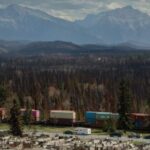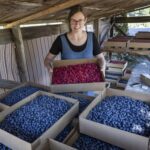In a rare sit-down at his Queen’s Park office, Premier Doug Ford offered a glimpse into what might be called the “Ford Doctrine” – an assertive vision of Ontario that’s both independent within Canada and determined to carve its own path on the global stage.
“We really have to flex our muscles,” Ford told me during our conversation, leaning forward in his chair as afternoon light filtered through the windows overlooking the legislature grounds. “When Ontario succeeds, Canada succeeds. But we can’t wait for Ottawa on everything.”
The premier’s comments come at a pivotal moment. With federal-provincial tensions simmering over healthcare funding and climate policy, Ford appears increasingly comfortable positioning Ontario as a counterweight to federal authority – a stance that resonates with his base while raising eyebrows among constitutional experts.
“Ontario represents 40 percent of the Canadian economy and 15 million people,” Ford emphasized, tapping his desk for emphasis. “We’re larger than most countries. It’s time we acted like it.”
Behind this muscular rhetoric lies a pragmatic calculation. Recent Abacus Data polling shows Ford’s Progressive Conservatives maintaining a modest lead over their rivals despite challenges on healthcare and housing affordability. According to David Coletto, Abacus CEO, “Ford has successfully positioned himself as a champion for Ontario’s interests, which plays well across party lines.”
The premier’s interprovincial diplomacy has intensified in recent months. He’s built working relationships with premiers across the political spectrum, from Saskatchewan’s Scott Moe to Quebec’s François Legault. These alliances have proven effective in extracting concessions from Ottawa on carbon pricing and infrastructure funding.
Ford’s international ambitions are equally noteworthy. His government has opened new trade offices in India, Japan and throughout the United States, with more planned. Trade missions have become a hallmark of his second term, with delegations dispatched to key markets with increasing frequency.
“When I sit across from governors or international business leaders, I’m representing Ontario first,” Ford explained. “We’re not just another province – we’re a global economic power in our own right.”
Critics view these efforts differently. NDP Opposition Leader Marit Stiles has characterized Ford’s approach as “grandstanding that delivers headlines but not results.” Liberal leader Bonnie Crombie argues his international focus comes at the expense of domestic priorities.
“While the premier jets around talking about Ontario’s greatness, people can’t find family doctors or afford homes,” Crombie told reporters last week at a healthcare roundtable in Windsor.
The reality is more nuanced. Ford’s government has secured significant investment wins, including a $5 billion electric vehicle battery plant in Windsor and Volkswagen’s $7 billion facility in St. Thomas. As Manufacturing Ontario’s Sarah Watts confirms, “These investments represent the kind of advanced manufacturing renaissance Ontario needs.”
Yet domestic challenges persist. Emergency room wait times remain stubbornly high, with Healthcare Ontario reporting average waits of 20.3 hours for admission in December – among the longest on record. Housing starts have increased but still lag behind population growth, according to Canada Mortgage and Housing Corporation data.
When pressed on these issues, Ford’s tone shifts from bombastic to contemplative. “Look, I know families are feeling squeezed. I hear it every day,” he acknowledged. “But the long-term solution isn’t just spending more money – it’s growing our economy and becoming more competitive.”
This economic focus forms the backbone of what longtime Queen’s Park observers have begun calling the “Ford Doctrine” – a combination of fiscal conservatism, economic development and provincial autonomy that defies simple ideological categorization.
“Ford has created a distinct governing approach that borrows from traditional conservatism but isn’t bound by it,” explains Dr. Melissa Williams, political science professor at the University of Toronto. “He’s interventionist on economic development but resistant to climate regulations. He talks about smaller government while expanding provincial authority.”
This pragmatic flexibility extends to Ford’s relationship with Prime Minister Justin Trudeau. Despite public sparring, the two leaders have collaborated on key files including the CUSMA trade agreement and pandemic response.
“We’ll work with anyone who helps Ontario,” Ford said. “I don’t care what party they’re from. But I won’t hesitate to push back when Ottawa overreaches.”
This balancing act was evident during last month’s First Ministers’ meeting in Halifax. Ford joined other premiers in demanding increased health transfers while simultaneously signing bilateral deals on housing and childcare that benefit Ontario.
Looking ahead to the next provincial election in 2026, Ford shows no sign of moderating his approach. If anything, his assertive stance on provincial autonomy appears to be intensifying.
“The pandemic taught us we need to be self-reliant,” he reflected. “Whether it’s PPE manufacturing, critical minerals or food security, Ontario needs to control its own destiny.”
For everyday Ontarians, the implications of this provincial assertiveness remain unclear. Some see it as necessary counterbalance to federal centralization; others worry about a fragmented approach to national challenges like climate change and healthcare reform.
What’s certain is that Ford has fundamentally reshaped Ontario’s relationship with Ottawa and other provinces. Whether this “doctrine” becomes his lasting legacy depends on whether the economic results ultimately match his ambitious rhetoric.
As our interview concluded, Ford gazed briefly at a framed photo of his late brother Rob before offering a final thought: “I’ve never been afraid to ruffle feathers. But everything I do comes back to making life better for ordinary people. They’re the ones who’ll judge whether we got it right.”
For a premier who has consistently defied political expectations, that judgment—and the future of his distinctive doctrine—now rests with the people of Ontario.






